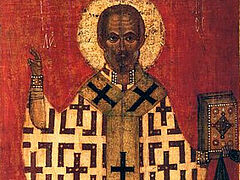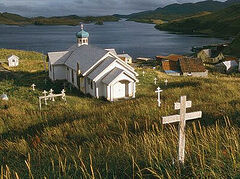 Usually for us a miracle is a change in the natural course of events by the intervention of supernatural powers. And a miracle is required when the natural course of events does not satisfy us—that is, in misfortunes. Then even sceptics (and even non-believers) timidly begin to ask the Heavenly realm for help. And they receive it!
Usually for us a miracle is a change in the natural course of events by the intervention of supernatural powers. And a miracle is required when the natural course of events does not satisfy us—that is, in misfortunes. Then even sceptics (and even non-believers) timidly begin to ask the Heavenly realm for help. And they receive it!
But what for? St. Nikolai (Velimirovic) wrote:
“During a drought people implore the Lord to send them rain, or when they are sick they beg for healing. And the Lord gives them what they ask for. Then some thank Him for help, while others thank Him for the miracle of strengthening their faith. For the miracle is more important than rains and good health. The rain and good health will pass, but the miracle will remain as evidence of the Living God, Who holds both rain and health in His power. 5,000 people were fed with five loaves of bread, but were hungry again by the morning, whereas the Lord’s miracle still feeds those who love Him...”
Thus, the greatest value of a miracle is in the strengthening of our faith. No wonder that the enemy of mankind immediately attacks us with doubting thoughts: “Isn’t it just a lucky accident? A coincidence?” But there is another extreme—by overuse of the word “miracle” people lose sobriety of judgment. So, experienced spiritual fathers advise us to use the phrase “God’s mercy” more often. This helps us avoid excessive enthusiasm.
And yet, with all the “excesses”, at certain stages of spiritual life, encounters with miracles give us great support us.
The holy Wonderworker St. Nicholas
Actually, all the saints are miracle-workers. But since ancient times Orthodox Christians have honored the Holy Hierarch Nicholas, the archbishop of the modest town of Myra in the region of Lycia, with the special title of “Wonderworker”. The Church of his age produced many glorious saints, noted for their pure lives and compassion for people. But obviously St. Nicholas’ heart was so extraordinarily merciful that he was remembered more than anyone else.
He is venerated by Christian nations, Muslims, and even pagans. There is a story related by employees of the Russian-Chinese Railway. One day an elderly Chinese man ran up to the railway station building and fell on his knees in front of St. Nicholas’ icon, which hung over the entrance. He was wet from head to toe and mumbled something in his language, shedding copious tears. Naturally, this attracted general attention. When the Chinese man calmed down a bit, they asked him what had happened. He explained that as he was fishing, a squall suddenly broke out and overturned his boat. He was far from the shore and started drowning in the waves. Rescue was nowhere near, and the old man suddenly remembered that Russians often turned for help to “some Saint Nicholas”. With the last bit of his strength he shouted: “Russian Nicholas, help me!”, and lost consciousness. He came to on the beach and there was no one around.
But Boris Shiryayev1 in his short story, “The Comforting Priest”, described a completely different reaction to a miracle. A certain commissar2 boasted to a priest that he did not believe in God because he was “conscious.” The priest wondered whether he as a “conscious” man had never invoked the name of God in his life. The commissar was a little embarrassed:
“Yes, on one occasion. Once, the Cossacks pounced on our string of carts at night. Since I was in my underwear, I instantly hid under the cart. A Cossack noticed that. He circled on horseback around the cart, trying to reach me with a lance. I kept jumping like a hare, now to the front, now to the back. It was then that I remembered God, the Mother of God, St. Nicholas the God-pleaser and everyone else. The Cossack waved his hand and galloped off. Then I crossed myself. Right. But that was from fear, and fear is the basis of religion...”
To which the priest reasonably remarked:
“Why didn't you call on another name out of fear?”
A miracle
Once I was a witness of a simple miracle at the Moscow Blood Transfusion Institute.3
It was a long time ago, in the mid-1990s; medical treatment then was much less effective than it is now, and the reality of life was much tougher. There were no charitable foundations, and everyone climbed out of their tragic situations as best they could.
A very young woman was admitted there with a relatively mild diagnosis, and the doctors managed to save her life. But the drugs that were used in such cases severely affected one tibia of her leg. The problem could be resolved by replacing the destroyed area with an artificial bone.
In our days this is a fairly common operation. But back then the words, “bone replacement”, were a wonder in itself, and the prosthesis cost 25 million rubles.
Fortunately, the doctors promised to perform an operation for free because the lady was a student at a Moscow university and had a Moscow residence permit. But, unfortunately, she didn’t have 25 million. To be exact, she was penniless. And for her mother, a pensioner from the Russian backwoods, such a sum of money was beyond her wildest dreams.
Her ward-mate, a nun, told her to “Pray to St. Nicholas!”
The young lady heeded this advice and began to pray with simplicity and zeal. She would even fall asleep with an akathist to the saint.
One day, as (with the help of her mother) she was limping along the corridor on crutches, they met a fellow patient, an Ossetian man, who sympathized with the girl: “Poor thing! You’re disabled and have ended up in this hospital.” Her mother burst into tears and shared their misfortunes with him. The man became agitated and said with his Caucasian accent: “I’ll give you ten million!” Overwhelmed by unexpected joy, the mother started sobbing again:
“Glory to God, a beginning has been made!”
“How much do you need?”
“Twenty-five...”
The unexpected benefactor thought a little and said:
“I won’t promise anything, but I'll talk to my friends.”
The next day he brought a whole packet of money, and the young lady was operated on. Leaving home, she could already carefully stand on her leg.
I don’t know where she is now and whether she is alive or not. But I believe that with God it is easier to live and die. I don’t know what became of her benefactor either. People of his age with such diagnoses rarely survived. But I believe that God is not a God of the dead, but of the living (Lk. 20:38). And I also believe that the merciful will be in a blessed state after death...




